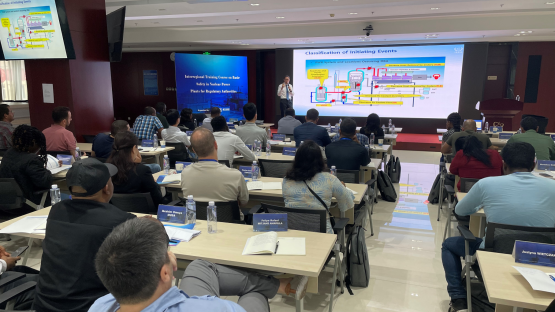The IAEA, together with the Nuclear Industry College of the China Atomic Energy Authority, trained 46 young professionals from regulatory bodies in 30 countries on the basics of nuclear safety in July. The ‘Interregional Training Course on Basic Safety of Nuclear Power Plants for Regulatory Authorities’ course took place from 24 June to 19 July 2024 in Beijing. Participants, many from countries embarking on or expanding their nuclear power programmes, received a broad overview of safety concepts and their application to nuclear reactor design, construction, commissioning and operation.
The IAEA developed the course to train recently recruited junior staff in nuclear regulatory bodies and thus assist countries in their human resource development. A competent national regulatory framework for safety is required in all phases of the development of a nuclear power programme, and this course underscored the IAEA Milestones Approach. “Building sufficient competence in nuclear regulatory bodies is vitally important, particularly in countries embarking on a nuclear power programme,” explained Ugur Bezdeguemeli, IAEA Nuclear Safety Officer.
“China has integrated nuclear safety into the entire process of nuclear energy development and utilization. This year marks the 40th anniversary of China's accession to the IAEA, and China will continue to use the International Training Centre for Nuclear Power Capacity Building and the Nuclear Security Collaboration Centre, established in cooperation with the IAEA, to deepen cooperation with other Member States, and support developing countries in nuclear energy safety and development,” said Huang Ping, Secretary General of the China Atomic Energy Agency, in his opening remarks.
The training course was organized to assist countries in developing nuclear power programmes, following an increase in interest expressed by IAEA Member States. By addressing common issues identified in many countries, it helped create an enabling environment for the safe and sustainable introduction or expansion of nuclear power. Participants had the opportunity to share their national experiences, thereby fostering networking among countries embarking on nuclear power programmes or expanding their existing nuclear power programmes.
“Our goal is to cultivate an environment that supports the smooth expansion of nuclear power. We at the IAEA are committed to enhancing information-sharing, encouraging networking among countries and addressing infrastructure specifics, including small modular reactors. Participants expressed confidence that they can now better serve their countries' regulatory systems and safety cultures. The IAEA will continue assisting countries with regulatory capacity building to ensure safe nuclear activities,” said Jing Zhang, Section Head of the Division for Europe, IAEA Department for Technical Cooperation.
Seven IAEA experts, together with local experts from China, delivered classroom lectures, exams, and technical tours. Attendees visited China's nuclear facilities, including nuclear power plants and small modular reactors in Beijing, Chengdu and Haikou, China, and engaged with regulatory agencies, fostering networking and knowledge sharing.
“The innovative approach of combining practical visits with lectures created a comprehensive and engaging learning environment, significantly enhancing the effectiveness of the training. Presentations were enriched with case studies, real-world examples, and interactive discussions, providing a balanced mix of knowledge and practical insights," said Mohammed Musharaf, an international expert from the Pakistan Nuclear Regulatory Authority.
The training course is one of 99 events, including training courses, workshops and fellowships, that will be held from 2024-2026 as part of the IAEA’s technical cooperation project on nuclear infrastructure development.





